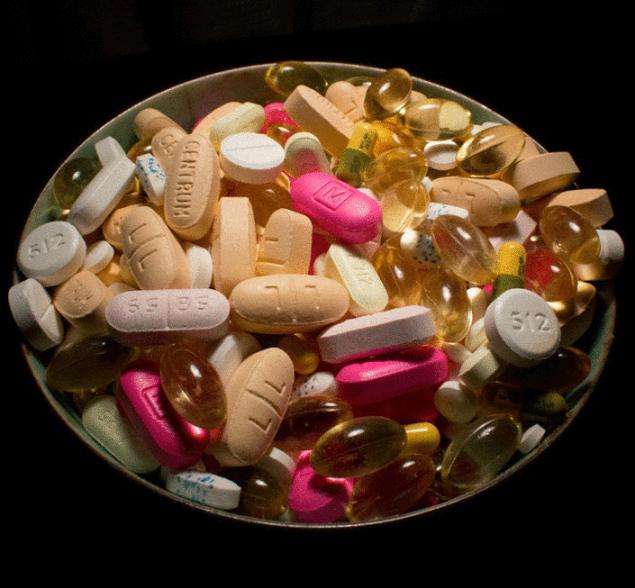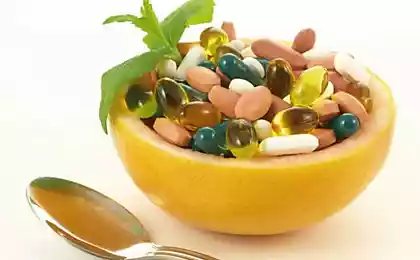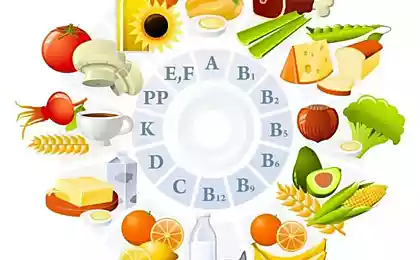443
Did You know that vitamins can kill

Tablets multivitamins do not protect us from disease and may even increase the risk of developing some cancers. This sensational information appeared in the issue of "Lancet", the most influential scientific medical journal in the world.
How well-founded the statement of the scientists? The drugs with the multivitamin in the form of tablets, capsules and syrups have become in our lives.
Advertising and promotion did the trick — many start their day with tablets containing vitamins and minerals. Someone prefers multivitamins registered as medicines someone takes dietary Supplements — dietary Supplements.
The essence of drugs remains the same, filling them approximately the same. And this behavior greet the scientists. The official position, repeatedly voiced by the specialists of research Institute of nutrition Russian Academy of medical Sciences, lies in the fact that our compatriots do not have enough vitamins, and to consume them should not courses 2-3 times per year, and almost constantly.
To find in Russia a specialist who would openly stood in opposition to this preventive intake of vitamins, is almost impossible. Meanwhile, in recent years abroad have repeatedly appeared serious scientific studies that use of multivitamins has been seriously questioned.
And what is interesting: in Russia, none of these studies have not received much publicity or scientific press or in public.
Beta-carotene vitamin a increases mortality by 30% and vitamin E — for 10% It is discovered by scientists who studied the effect of multivitamins on prevention of malignant tumors of the digestive system: "We were unable to find evidence that supplements with antioxidants can prevent the development of cancer of the gastrointestinal tract; instead, they may increase mortality," they write in the pages of "the Lancet".
Worse than others have shown themselves of a combination of beta-carotene with vitamins A and E (that these "vitamins" and they have a main negative in recent years). Beta-carotene in the company of vitamin A increased mortality by almost 30% and vitamin E by 10%.
Although these figures are statistically significant, the researchers delicately say they are not sure, use the term "possible".And, once again, they emphasize the need for further research to dot the i.
But, this time scientists had the courage to calculate the possible losses associated with an excessive fascination with vitamins.
"If the discovery of scientists is correct, write in the comments to the article in "the Lancet" David Forman from the University of Leeds and Douglas Altman of the English society for the study of cancer (Cancer Research, UK), out of every 1 million people consume these drugs, 9,000 people die prematurely."
The prospect that some vitamins not only have side effects but can kill they call a "frightening proposition".
How was the research Sensational research conducted to the highest standards by a team of scientists included in the "Khranovskoho cooperation" (Cochrane Collaboration). This influential international organization dedicated to reviewing clinical trials of drugs, dietary Supplements and various therapies. To do this, use so-called meta-analysis: gather all the research on a certain topic, choose those that are made correctly (in science very much evident "Linden"), generalize their data and cheated again.
Thanks to this approach, combining a very large number of people may be new and unexpected data. In this case, scientists have summarized 14 studies previously conducted, which were attended by more than 170 thousand people.
All studies were devoted to the study of antioxidant vitamins for the prevention of malignant diseases of the digestive system — cancers of the esophagus, stomach, intestines, pancreas and liver. Among the antioxidants included beta-carotene (the precursor of vitamin A in the body), vitamin a itself, as well as, vitamins C, E and selenium.
These substances are well-known and popular drugs with them are innumerable. Usually, they are used to protect the body against heart disease, cancer and aging in General. The logic for such purpose is clear: antioxidants neutralize free radicals that contribute to the development of all these diseases, including aging. This is only in theory, but in practice, it is somehow different.
A null result in cardiovascular diseases and the prevention of cancer two years ago in "the Lancet" published the results of a very large study Heart Protection Study. It was attended by over 20 thousand people with high risk of cardiovascular disease. They studied the protective effects of antioxidants — beta-carotene and vitamins C and E. the Result is zero.
During the five-year observation, the drugs did not prevent the development of heart attacks, strokes and various cancers.
At the same time, the contents of the vitamin in the blood increased. But they why-that did not work. Despite these data, medications and dietary Supplements with antioxidants to protect the heart and blood vessels continue to be issued, registered and advertised. It happens not only in Russia but throughout the world.
Very loud scandal has occurred even earlier, in 1998. Then the world health organization (who) and the International Agency for research on cancer (IARC), part of the structure of the organization, issued an official warning that drugs with beta-carotene and close to him substances should not be used for cancer prevention.
This is the conclusion of leading scientists have analyzed the results of numerous studies on the prevention of diseases with beta-carotene and vitamin A. none of these studies, the drugs had no significant preventive effect, warned then Dr. Harri Vainio, who heads one of the branches of the IARC.
Moreover, among smokers volunteers receiving the drugs, have found higher risk of lung cancer and increased mortality from cardiovascular disease.
Our group came to the conclusion that there is no additional information about how beta-carotene and other carotenoids influence the processes leading to cancer, none of these substances should not be sold to the public as drugs preventing the development of tumors.
In the meantime, cancer prevention fresh fruits and vegetables remains more effective than taking one or more such substances, in the form of dietary supplements.
It's been six years, new data on the negative effects of beta-carotene and other antioxidants, but who and now there. Commercial use of such drugs continues. Serious studies proving its efficacy and safety, the manufacturers do not spend. Unlike medicine, "the vitamins" are considered safe and useful a priori.
The thing is — molecules Why is a scientific theory not borne out in practice? It looks like the problem in chemistry: the antioxidants in the composition of fruit and vegetable work, and the same substance from the tube — no.
Biochemists are well-known such cases, when "living" molecules behave differently than their synthetic copies. Often this is due to isomerism — the phenomenon in which identical molecules have different arrangement of atoms in space. Here we can recall the so-called TRANS fats, which behave differently than the natural fats of the same molecular composition. Or amplifier taste of sodium glutamate, widely used in the food industry. It also exists in the form of two isomers: live glutamate from natural sources is different from synthetic. Also, alive vitamins in fruits and vegetables are always "contaminated" with a lot of accompanying substances, which often play a useful role. And clean chemical vitamins do not have these properties.
Anyway, research in these areas can give us in the coming years a lot of surprises. And not all of them will be pleasant. published
Author: Alexander Melnikov, PhD
Source: zolotoyvek.info/news/tid20/























